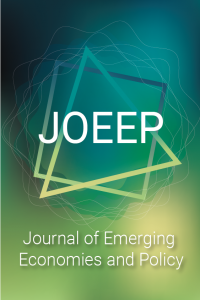GLOBAL KRİZ SONRASI TÜRKİYE’DE EKONOMİK RİSK FAKTÖRLERİ1
Finansal Krizler, küresel ekonomi, Türkiye
ECONOMIC RISK FACTORS IN TURKEY AFTER THE GLOBAL CRISIS
Financial Crisis, Global Economy, Turkey,
- Yayın Aralığı: Yılda 2 Sayı
- Başlangıç: 2016
- Yayıncı: Seyfettin ERDOĞAN
HALKLA İLİŞKİLER AÇISINDAN ÖRGÜTSEL İLETİŞİM ALGISI
KURUMSAL YÖNETİMDE KAMUYU AYDINLATMA VE ŞEFFAFLIK İLKESİNİN YERİ VE ÖNEMİ 1
GEZGİN SATICI PROBLEMİNİN GENETİK ALGORİTMALARLA ÇÖZÜMÜNDE BAŞLANGIÇ POPÜLASYONUN BELİRLENMESİ
Meryem PULAT, İpek DEVECİ KOCAKOÇ
KARŞILAŞTIRMALI MALİ TABLOLAR ANALİZİ1
SAĞLIK SEKTÖRÜNDE MÜŞTERİ MEMNUNİYETİNİN ÖLÇÜMÜ: SİMAV DEVLET HASTANESİ ÖRNEĞİ1
COST OF LIVING IN OTTOMAN EMPIRE DURING THE ARMISTICE PERIOD: A CASE OF ISTANBUL1
GELİŞEN SEKİZ İSLAM ÜLKESİNİN (D-8 ÜLKELERİNİN) DIŞ TİCARETİNİN YETERLİLİK ANALİZİ
Yavuz TÜRKAN, Abdurrahman ALAKUŞTEKİN
Prof Dr Hüseyin ALTAY, Abdulkarim ALHAMOUD, Bekir Bora DEDEOĞLU
GLOBAL KRİZ SONRASI TÜRKİYE’DE EKONOMİK RİSK FAKTÖRLERİ1
HAVAYOLU TEDARİKÇİLERİNİN HAVAYOLU VE HAVAYOLU MÜŞTERİLERİ İLE İLİŞKİLERİ: BALIK-KILÇIK MODELİ1
